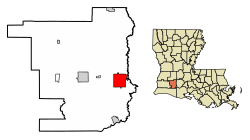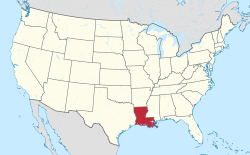Type a search term to find related articles by LIMS subject matter experts gathered from the most trusted and dynamic collaboration tools in the laboratory informatics industry.
Jennings, Louisiana | |
|---|---|
| City of Jennings | |
 The front facade of the W. H. Tupper General Merchandise Museum, circa 2008 | |
| Motto: "Cradle of Louisiana Oil"[1] | |
 Location of Jennings in Jefferson Davis Parish, Louisiana. | |
 Location of Louisiana in the United States | |
| Coordinates: 30°13′20″N 92°39′25″W / 30.22222°N 92.65694°W | |
| Country | United States |
| State | Louisiana |
| Parish | Jefferson Davis |
| Founded | May 2, 1888 |
| Area | |
| • Total | 10.58 sq mi (27.40 km2) |
| • Land | 10.56 sq mi (27.35 km2) |
| • Water | 0.02 sq mi (0.05 km2) |
| Elevation | 26 ft (8 m) |
| Population (2020) | |
| • Total | 9,837 |
| • Density | 931.53/sq mi (359.67/km2) |
| Time zone | UTC-6 (CST) |
| • Summer (DST) | UTC-5 (CDT) |
| ZIP code | 70546 |
| Area code | 337 |
| FIPS code | 22-38355 |
| Website | City of Jennings, Louisiana |
Jennings is a city in, and the parish seat of, Jefferson Davis Parish, Louisiana, United States,[3] near Lake Charles. The population was 10,383 at the 2010 census, a small decline from the 2000 tabulation.[4]
Jennings is the principal city of the Jennings Micropolitan Statistical Area, which includes all of Jefferson Davis Parish. It is also part of the larger Lake Charles-Jennings Combined Statistical Area. It is also part of the large, 22-parish Acadiana region of the state, with a large Francophone population, many descended from early Acadian settlers.
For whom the town was named, Jennings McComb was an Irish contractor for the Southern Pacific Railroad. He built the Jennings depot on a divide peculiar to the southwest Louisiana. This became the center of new development based on the railroad. The first settler was recorded as A. D. McFarlain, who came in 1881 from St. Mary Parish and opened a store. McFarlain also became the first rice grower, postmaster, brickmaker, and builder in the community. Prospering with Jennings’ growth, McFarlain was considered one of the town's prominent businessmen and civic leaders.
The Jennings area attracted numerous wheat farmers from Iowa, Kansas, Nebraska, and other Midwestern states. The new settlers of southwest Louisiana were referred to as "Yankees" by the natives, who were of Acadian French and African-American descent. They had settled along the waterways in the parish, which they had relied on for transportation before the railroad. They fished in the bayous. The Cajuns gave appreciable aid to the settlers in homesteading and homemaking. The people grew rice, cotton, sweet potatoes, and corn.[5]
Sylvester L. Cary reached this area on February 7, 1883, from Iowa. He became known as the town's "father," as he persuaded other Iowans to relocate there. He said he was "seeking a home where there was neither winter nor mortgages."[5] So impressed was Cary by the fertile country around the Jennings depot that he shared his findings with others. He attracted fellow Midwesterners to southwest Louisiana by writing to friends in Iowa, extolling the area. When he returned to Iowa to pack up his family for the move to Jennings, he persuaded several neighbors preparing to migrate west, to follow him to Jennings and southwest Louisiana.[5]
Much of southwest Louisiana was developed by the North American Land and Timber Co., which owned large portions of land. Seaman A. Knapp, president of the Iowa State College of Agriculture, was engaged in 1885 to demonstrate the region's suitability for rice production. Knapp attracted a number of Iowans to settle the area.[6] The land company placed advertisements in newspapers published in the Midwestern states.
On May 2, 1888, the settlement of Jennings was incorporated as a village. In 1901, a fire destroyed a large portion of the wooden structures in Jennings.[5]
That same year, Jennings was the site of the first oil well to produce in Louisiana, revealing its first oil field. Oil brought a boom to the town for a period. When oil production declined, the basic agricultural economy of the parish supported the town.[5]
Jennings is located at 30°13′20″N 92°39′25″W / 30.22222°N 92.65694°W (30.222207, -92.656880)[7] and has an elevation of 26 feet (7.9 m).[8]
According to the United States Census Bureau, the city has a total area of 10.3 square miles (27 km2), of which 10.2 square miles (26 km2) is land and 0.04 square miles (0.10 km2) (0.19%) is water.
The climate in this area is characterized by hot, humid summers and generally mild to cool winters. According to the Köppen Climate Classification system, Jennings has a humid subtropical climate, abbreviated "Cfa" on climate maps.[9]
| Climate data for Jennings, Louisiana (1991–2020 normals, extremes 1897–present) | |||||||||||||
|---|---|---|---|---|---|---|---|---|---|---|---|---|---|
| Month | Jan | Feb | Mar | Apr | May | Jun | Jul | Aug | Sep | Oct | Nov | Dec | Year |
| Record high °F (°C) | 83 (28) |
87 (31) |
92 (33) |
97 (36) |
100 (38) |
104 (40) |
105 (41) |
105 (41) |
107 (42) |
98 (37) |
95 (35) |
89 (32) |
107 (42) |
| Mean daily maximum °F (°C) | 60.1 (15.6) |
63.9 (17.7) |
70.7 (21.5) |
77.1 (25.1) |
83.7 (28.7) |
88.5 (31.4) |
90.2 (32.3) |
91.0 (32.8) |
87.7 (30.9) |
80.4 (26.9) |
70.2 (21.2) |
62.5 (16.9) |
77.2 (25.1) |
| Daily mean °F (°C) | 50.9 (10.5) |
54.5 (12.5) |
61.1 (16.2) |
67.5 (19.7) |
74.8 (23.8) |
80.3 (26.8) |
81.9 (27.7) |
82.1 (27.8) |
78.3 (25.7) |
69.5 (20.8) |
59.7 (15.4) |
53.1 (11.7) |
67.8 (19.9) |
| Mean daily minimum °F (°C) | 41.6 (5.3) |
45.1 (7.3) |
51.5 (10.8) |
57.8 (14.3) |
65.9 (18.8) |
72.0 (22.2) |
73.7 (23.2) |
73.2 (22.9) |
69.0 (20.6) |
58.7 (14.8) |
49.2 (9.6) |
43.6 (6.4) |
58.4 (14.7) |
| Record low °F (°C) | 10 (−12) |
9 (−13) |
20 (−7) |
32 (0) |
39 (4) |
46 (8) |
59 (15) |
59 (15) |
43 (6) |
27 (−3) |
22 (−6) |
10 (−12) |
9 (−13) |
| Average precipitation inches (mm) | 6.29 (160) |
4.25 (108) |
3.77 (96) |
4.79 (122) |
5.52 (140) |
6.61 (168) |
5.36 (136) |
6.80 (173) |
5.80 (147) |
4.73 (120) |
4.85 (123) |
4.74 (120) |
63.51 (1,613) |
| Average snowfall inches (cm) | 0.0 (0.0) |
0.0 (0.0) |
0.0 (0.0) |
0.0 (0.0) |
0.0 (0.0) |
0.0 (0.0) |
0.0 (0.0) |
0.0 (0.0) |
0.0 (0.0) |
0.0 (0.0) |
0.0 (0.0) |
0.1 (0.25) |
0.1 (0.25) |
| Average precipitation days (≥ 0.01 in) | 11.6 | 10.2 | 8.9 | 7.8 | 8.0 | 12.2 | 14.2 | 12.8 | 9.8 | 7.8 | 8.9 | 11.3 | 123.5 |
| Average snowy days (≥ 0.1 in) | 0.0 | 0.0 | 0.0 | 0.0 | 0.0 | 0.0 | 0.0 | 0.0 | 0.0 | 0.0 | 0.0 | 0.1 | 0.1 |
| Source: NOAA[10][11] | |||||||||||||
| Census | Pop. | Note | %± |
|---|---|---|---|
| 1890 | 412 | — | |
| 1900 | 1,539 | 273.5% | |
| 1910 | 3,925 | 155.0% | |
| 1920 | 3,824 | −2.6% | |
| 1930 | 4,036 | 5.5% | |
| 1940 | 7,343 | 81.9% | |
| 1950 | 9,663 | 31.6% | |
| 1960 | 11,887 | 23.0% | |
| 1970 | 11,783 | −0.9% | |
| 1980 | 12,401 | 5.2% | |
| 1990 | 11,305 | −8.8% | |
| 2000 | 10,986 | −2.8% | |
| 2010 | 10,383 | −5.5% | |
| 2020 | 9,837 | −5.3% | |
| U.S. Decennial Census[12] | |||
| Race | Number | Percentage |
|---|---|---|
| White (non-Hispanic) | 6,364 | 64.69% |
| Black or African American (non-Hispanic) | 2,782 | 28.28% |
| Native American | 31 | 0.32% |
| Asian | 30 | 0.3% |
| Pacific Islander | 3 | 0.03% |
| Other/Mixed | 387 | 3.93% |
| Hispanic or Latino | 240 | 2.44% |
As of the 2020 United States census, there were 9,837 people, 3,862 households, and 2,390 families residing in the city.
Jefferson Davis Parish Public Schools operates public schools serving Jennings. The schools serving Jennings, all within the city, include Jennings Elementary School (pk-6), and Jennings High School (7-12) [1].
Bethel Christian School is a PreK-12 Christian school located in unincorporated Jefferson Davis Parish, near Jennings.[16]
Jefferson Davis Parish Library operates the Headquarters Branch at 118 West Plaquemine Street in Jennings. In addition the City of Jennings operates the Jennings Carnegie Public Library at 303 North Cary Avenue.[17]
Our Lady Immaculate (OLI) is a Catholic school serving grades PREK-8.